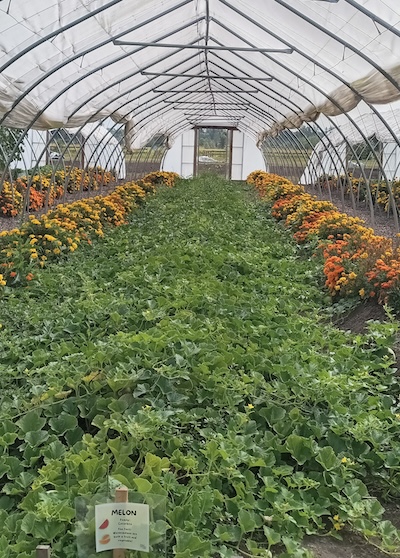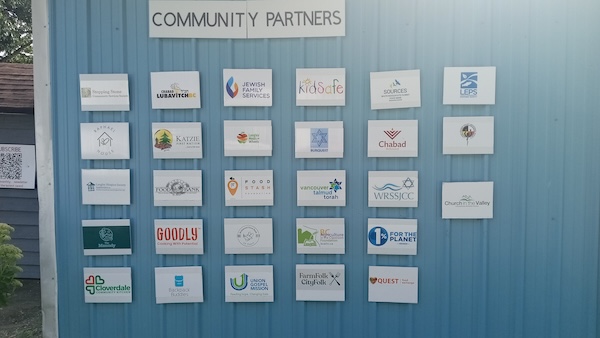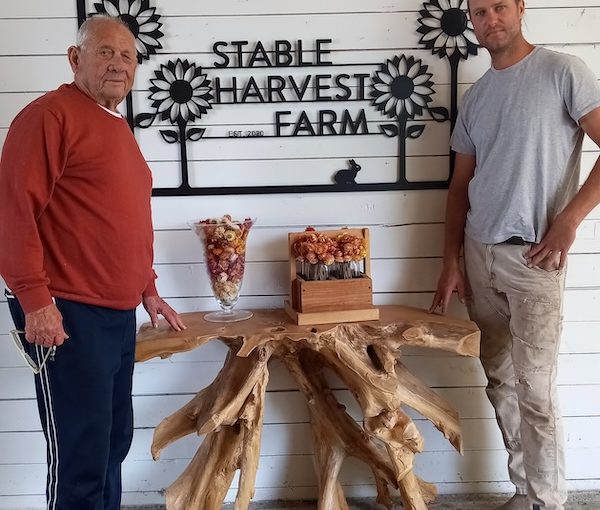Syd Belzberg, left, founder of Stable Harvest Farm in Langley, and farm manager Kristjan Johannson. (photo by Cynthia Ramsay)
The Jewish Independent visited Syd Belzberg at Stable Harvest Farm in Langley last week, taking a tour of the 65-acre property with Belzberg and farm manager Kristjan Johannson. Much has happened since the JI last visited, in 2021, just a year after the reimagined farm opened.
The land had laid empty for many years, having previously been a horse farm. An organic produce farm for the past four years, its focus is education. (See jewishindependent.ca/hands-on-learning-at-farm.)
About 100 students a day visit from late April to the end of June, then again from the first week of September to the end of October.
“We’ve got it down to a science,” said Johannson. “About an hour-and-a-half a session, two hours. They come in, they get a welcome speech. We have picnic tables up in the main season. We do a 12-station immersive tour, partnered with BC Agriculture in the Classroom [Foundation], so it’s all specific to the curriculum of the province.”
There are elementary and intermediate student groups who do the sessions. Participants receive workbooks and, every six or seven minutes, a cowbell rings and they move to the next station, where another agriculturalist meets them. University students lead the programs.
The farm also runs harvest projects for the kids. “Radishes were a big hit this year,” said Johannson. There were six beds of radishes planted and harvested.
Over the summer, it’s camp, church and other groups that come to the farm, said Belzberg, and they have different reasons for doing so: perhaps to see the bees, or the butterflies. “This summer, we kept the amount of guests down because we are developing and changing so many things,” he said.
The growing process begins indoors. “We’re able to push the season in that way,” said Johannson. “We start all our plants indoors in the nursery tunnel and that way we get a 30- to 60-day head start, and then it allows us, in a short season, to get two crops of most produce.”

In addition to the planting beds, there are gardens. Belzberg’s friend David Bogoch, another member of the Jewish community, started the Biblical Garden, as well as a couple of other flower beds, which Bogoch maintains with the Stable Harvest Farm team.
“Rabbis normally spend 20 to 30 minutes in here,” said Belzberg of the Biblical Garden, which features four of the seven plants the Hebrew Bible uses to describe the land of Israel – wheat, barley, figs and grapes. “We can’t grow dates, pomegranates or olives, but we’re working on pomegranates and olives!” said Johannson, referring to a greenhouse that’s under construction.
Johannson also noted that there was a “very happy, healthy ‘Tree of Knowledge,’” an apple tree, but though the “Fujis are looking very good,” the fruit is not quite ready for harvesting.
Vancouver Talmud Torah probably brings the most kids to the farm, said Belzberg. Grade 3 students, for example, may come in and plant vegetables in spring and then they come back in the fall, as Grade 4s, to harvest what they planted.
When students participate in an education tour, they leave with something the farm produces. That might be honey from one of the 30 hives on the farm (1,500 pounds of honey was extracted a few weeks ago by 40 to 50 volunteers) or bee-forage bookmarks with seeds embedded in them.
“You take the bee off [the bookmark] and plant it in the ground and they [still] have our bookmark with all our information on it,” explained Johannson. “Basically, you have a bunch of kids guerrilla gardening, chucking paper and pouring water on it and having plants that turn into bee forage. Then, they also get popcorn from us or they get sunflower seeds, so, if you’ve got a garden at home, you can plant the corn and plant the sunflowers. If you don’t, you can eat the sunflower seeds and pop the corn.”
Johannson and Belzberg have been working together since the retrofit in 2020, when the farm was converted from housing horses to growing produce.
“We do lots of cover crops and set-asides,” said Johannson, standing next to a field (block) that is lying fallow for a year. “That’s how we build fertility here organically. There are three different types of clover … and all this clover fixes nitrogen from the atmosphere in the ground and then all of this down here will be our organic matter for the next season. We’ll do that on rotation. There are five blocks, so this block here was a cover crop last year.”
Farm heritage chickens and Nigerian Dwarf goats, as well as other animals that pass through or unofficially make their home somewhere on the farm, help keep the soil healthy. “They’ll end up eating all this down and then pooping it [around],” explained Johannson.
We drove past some wheat, which is grown especially for Lubavitch BC’s Model Matzah Bakery.
“Originally, we would just supply the wheat and they would do their thing,” said Belzberg. “In the last year, we changed it…. Everything here was planted by the kids in May. They’re coming back Sept. 8 to harvest it. Then we will store it for them and, at Pesach time, they’ll use it … [in] making the matzah with the bakery, so they’ve got the full cycle.”
For the Lubavitch BC program, some of the wheat harvested by the kids in September won’t be put through a thresher, but rather, in the weeks before Pesach, at the Matzah Bakery, the kids will learn how to remove the grain from the chaff by hand. They’ll put the grain in a stone mill and grind it into flour. “For the sake of expedience, we already have the dough ready,” noted Johannson. “And the kids grab it, it goes onto some sheets and then goes into a pizza oven. They are so good, very efficient,” he said of Lubavitch BC. “They’re the same as our [education] project out here, you’re in and out in an hour and 15.”

Stopping at several “tunnels,” in which there are rows of flowers alternating with produce – melons, tomatoes, cucumbers, etc. – Johannson picked some treats for the Jewish Independent while talking about the layout.
The flowers are good for pollinators, but also attract the aphids and other bugs, he said. “We come through when they’re all pest-affected, we bag [the flowers] up and remove the pests out of the game.”
There have been challenges over the years – notably, in 2021, both the heat dome and the atmospheric river – and there have been some less successful crops. Johannson pointed to a field of Phacelia. “It’s still going to flower, but … it was too hot when they went in. A lot of the time, with vegetables, with life, with people, if you don’t have a good start to things, things don’t end up well.” The area will become a different cover crop next year, he said.
And there have been other learning opportunities. “This we called the Coyote Area,” said Belzberg as we passed another part of the property. “But we had to change it about a month ago because we had a group of kids out and they were afraid to come [see it]. Now it’s called Beaver Park.”
Belzberg would like to see even more school groups come to the farm, and he’d like to see multiple events happening at one time. In progress are many significant initiatives, from planting more trees (for birds and shade), to grooming an area of the farm for scavenger hunts and orienteering, to building a nature-based playground, to creating an overnight camping section, to adding a picnic area, and to converting what used to be a riding arena into a place where kids can come and do educational projects when it’s raining.
The education aspect of the farm gives Belzberg the greatest satisfaction and enjoyment, he said. “That’s my passion.”
While all the activities at the farm are at no cost to visiting groups, busing kids out to Langley can be expensive, so the farm takes some of their programs to the schools themselves. Belzberg gave Talmud Torah as an example: a program held at the school can reach 500 kids in one or two days, he said.
As well, Belzberg and his team are trying to get funding for a program that would help schools with the cost of busing. “We’re looking to be able to subsidize some or all of that cost,” he said.
As to what Belzberg gets from all these efforts?
“It’s a work of love,” he said. “It’s coming out here, developing it and seeing it grow and become more beautiful [and], mostly, when you get the kids out here.”

